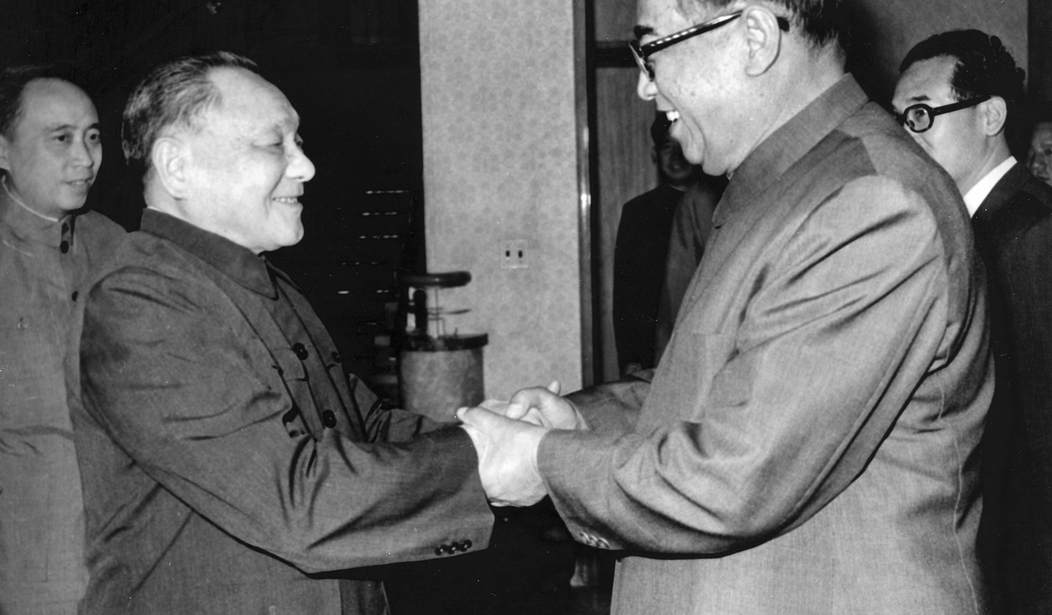China's four-decade rise from hunger-plagued developing country to great power with global clout ranks as one of world history's more remarkable political-economic achievements.
The Chinese dragon is back with fire in its belly -- economic, military and political fire with Chinese (authoritarian) characteristics that is erasing a century of Chinese humiliation at the hands of foreigners.
The previous sentence summarizes the Chinese Communist Party's preferred propaganda narrative. The CCP's revivalist narrators, however, utterly avoid mentioning the June 4, 1989, Tiananmen Square massacre of Chinese citizens by the People's Liberation Army, to the point of forbidding its discussion and attempting to erase the event from history.
On that June day three decades ago, PLA soldiers entered the square, and at the order of Communist leader Deng Xiaoping, slaughtered at least 2,000 pro-reform demonstrators. The demonstrators had committed the grievous crime of challenging the party's hardline leaders by making a statue called the Goddess of Democracy, supporting reform-minded leaders and peacefully appealing for political liberalization to accompany Deng's economic modernization program.
Some sources contend the death toll greatly exceeded 2,000. Perhaps Beijing's secret police know the exact death toll. No one else does. The government immediately began to deny the June 4 slaughter.
The government has tried to erase photo evidence of the massacre, or at least prevent mainland China's people from seeing images on the internet. Arguably the most iconic photo was snapped June 5, the day after the slaughter: In Tiananmen Square, a lone Chinese man stands before a PLA main battle tank. The man carries two shopping bags. There is video of the incident. After the tank stopped, the courageous fellow climbed aboard and spoke with the soldiers. He was eventually dragged into the crowd, and ... then he disappeared. The government still claims it has never found the man and doesn't know his name. Realists believe he is in a secret jail or an unmarked grave.
Recommended
The communist government regards June 4, 1989, as dangerous knowledge, for it exposes the terrible contradiction in China's dramatic rise from poverty. Beijing's Communists know the value of a competitive market economy and open exchange of information. At the same time, they demand dictatorial control over what Adam Smith called "the invisible hand" of individuals engaged in free enterprise.
In 1989, China's economic reforms were giving the people a taste of free market prosperity. In Tiananmen Square, free market reforms spurred calls for greater political freedom.
Two conflicting policies authored by Deng Xiaoping create China's great dilemma: his "opening and reform" program and his Four Cardinal Principles.
The Four Cardinal Principles enshrine CCP control: China must "uphold" the socialist path, adhere to the "democratic" CCP dictatorship and follow Mao's thought, etcetera. It's fossilized Marxism insisting on party unity.
"Opening and reform," however, promoted interdependent trade among nations, permitted foreign investment and ultimately liberalized the Chinese economy.
In early 2010, Beijing clashed with Google in an information access battle that repeated elements of the classic struggle between an "open society" and a "closed society." Google accused the Chinese government of hacking human rights activists' email accounts and told the Chinese government it was "no longer willing to continue censoring" internet search results for terms like "Tiananmen Square."
Beijing understands its corporations and creative citizens have to communicate globally in order for China to continue to remain economically competitive and create wealth.
But erasing Tiananmen Square is ultimately about authoritarian self-preservation. The slaughter stalks China's communist dictatorship. Chinese citizens bitterly resent the massacre and the totalitarian silence cloaking it. Complaints voiced in 1989 continue to anger Chinese citizens in 2019, such as China's weak and murky judicial system and the corrupt communist elites enjoying stolen wealth.
In retrospect, the Tiananmen Square massacre signaled that China's rise would not be peaceful, domestically or internationally.

























Join the conversation as a VIP Member